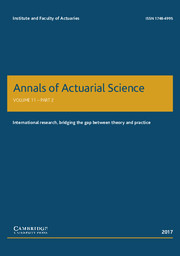Article contents
Multifactorial disorders and polygenic risk scores: predicting common diseases and the possibility of adverse selection in life and protection insurance
Published online by Cambridge University Press: 14 August 2020
Abstract
During the past decade, genetics research has allowed scientists and clinicians to explore the human genome in detail and reveal many thousands of common genetic variants associated with disease. Genetic risk scores, known as polygenic risk scores (PRSs), aggregate risk information from the most important genetic variants into a single score that describes an individual’s genetic predisposition to a given disease. This article reviews recent developments in the predictive utility of PRSs in relation to a person’s susceptibility to breast cancer and coronary artery disease. Prognostic models for these disorders are built using data from the UK Biobank, controlling for typical clinical and underwriting risk factors. Furthermore, we explore the possibility of adverse selection where genetic information about multifactorial disorders is available for insurance purchasers but not for underwriters. We demonstrate that prediction of multifactorial diseases, using PRSs, provides population risk information additional to that captured by normal underwriting risk factors. This research using the UK Biobank is in the public interest as it contributes to our understanding of predicting risk of disease in the population. Further research is imperative to understand how PRSs could cause adverse selection if consumers use this information to alter their insurance purchasing behaviour.
Keywords
Information
- Type
- Original Research Paper
- Information
- Copyright
- © Institute and Faculty of Actuaries 2020
Footnotes
The online version of this article has been updated since original publication. A notice detailing the changes has also been published
References
A correction has been issued for this article:
- 8
- Cited by
Linked content
Please note a has been issued for this article.

